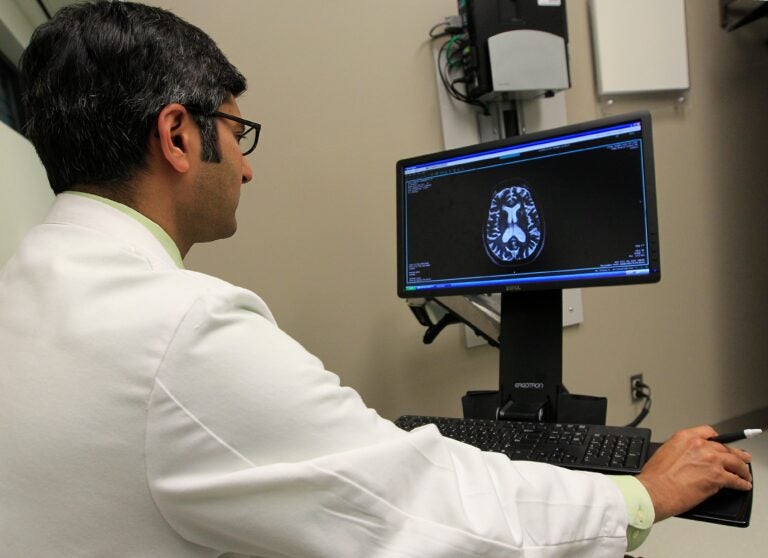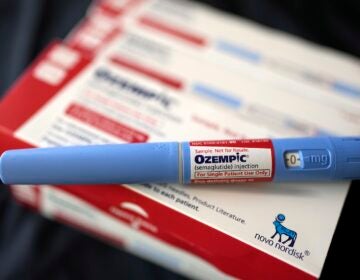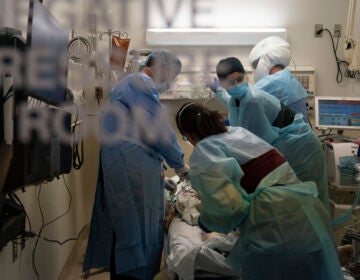Independence Blue Cross and Penn Medicine see faster patient testing with automatic insurance approvals
A joint program between the Philadelphia-based health giants gives some physicians automatic approval for common outpatient tests like MRIs and PET scans.
Listen 1:06
File - A doctor reviews an MRI before an appointment, Dec. 17, 2012, in Columbus, Ohio. (AP Photo/Jay LaPrete)
From Philly and the Pa. suburbs to South Jersey and Delaware, what would you like WHYY News to cover? Let us know!
Here’s a common scenario: a patient visits their primary care doctor for lingering back pain.
The doctor examines the patient’s back, asking them how it feels when they press here or there. The physician suspects a herniated disc, but orders an MRI to be sure.
In the best-case scenario, a patient quickly gets an appointment for the imaging scan, the outpatient procedure goes smoothly and the reason for the back pain is swiftly confirmed.
But that’s not always how it works. Care can get delayed as patients wait for their health insurance company to pre-approve the doctor’s orders. In some cases, imaging tests or procedures get denied or flagged for more intense review and additional documentation, delaying patient care and raising costs.
“We’ve got teams of people figuring this out,” said radiologist Dr. Mitchell Schnall, senior vice president for data and technology solutions at Penn Medicine. “Lots of our health care dollars are going into this administrative process.”
The process is called prior authorization, and it’s been at the center of reform talks in recent years.
A joint program by Independence Blue Cross and Penn Medicine is working to simplify that process at the local level by granting some physicians automatic approval for common tests and imaging if they have a history of few insurance denials.
New data from the initiative, first launched in 2023, shows that the majority of outpatient radiology requests within the program are approved in “one-tenth” of the time that the prior authorization process can typically take.
“Patients who have a short turnaround time for their tests, there’s this race — are we going to get them pre-auth’d in time or is it going to get caught up in process and we’re going to have to cancel the test the day of?” Schnall said. “With this program, we’re able to get people’s tests done quicker, we’re canceling fewer tests.”
Calls for prior authorization reforms
Prior authorization has come under scrutiny in recent years as the health care industry in general has become more complicated and costly.
Health insurance companies say it’s a necessary guardrail to contain costs and ensure that medications, testing and other health care services are medically necessary for the situation, and not erroneously prescribed.
National trade groups like the Association of Health Insurance Plans cite that an estimated 25% of health care spending is “unnecessary due to overtreatment, use of low-value care, lack of care coordination, outdated technology and fraud.”
Meanwhile, doctors and other health care practitioners argue that prior authorization can sometimes lead to unnecessary delays and administrative hurdles, leaving their patients without critical care.
When an insurer claims that a clinician’s recommended drug or procedure is not medically necessary, or there is another lower-cost option available, the original order can be denied for coverage.
Denial rates vary by insurance plan and data is not typically made public, but according to a survey of 1,000 practicing physicians published in February by the American Medical Association, 57% of providers reported that the prior authorization process often or always led to delays in care.
Last month, major health insurance carriers, including Independence Blue Cross, made a collective pledge to simplify and reform the process across commercial markets and public programs like Medicare and Medicaid.
“We have no interest in making the medical management process any harder than it needs to be,” said Dr. Rodrigo Cerdá, IBX chief medical officer. “I think this is just a way of taking a process and making it better for everybody involved.”
Independence and Penn reduce necessity of prior authorization requests
Officials from IBX and Penn Medicine say they’re already seeing success with their joint program.
More than 1,300 Penn physicians in outpatient care participate for ordering common tests like CT, PET and MRI scans and echocardiograms. They are eligible if they have a 12-month history of ordering tests with a 2% or lower denial rate with Independence Blue Cross.
Among physicians who were granted automatic approvals, about 83% of outpatient radiology requests were approved in “one-tenth” of the time compared to a normal prior authorization process, officials said.
“We are seeing much faster access,” Cerdá said. “And the providers are our partners. We want the provider experience to be as positive as possible.”
There was also a 9% overall reduction in “low value” requests, or tests that insurance companies consider “unlikely to provide useful information for diagnosing or treating a patient’s condition.”
“Or is there an equivalent or different test you could do or you might need to do that could be just as good or help you pick the right path of treatment that is significantly less expensive,” Cerdá said.
Schnall said the program has helped the Penn Medicine system use its time and resources more efficiently.
For example, before, if the radiology department had a last-minute opening and a patient in a nearby outpatient office was just prescribed an MRI scan, Schnall said they weren’t able to get that patient in because they had to wait for prior authorization. Not anymore.
“So, if your doc was in this program and I had a 2 p.m. opening, in fact you could go into that opening, because we didn’t have to go through a pre-auth process,” Schnall said. “That’s happening.”
There is ongoing quarterly monitoring to ensure participating physicians don’t “drift” and begin ordering more “low value” tests with their automatic approval status, Schnall said, but so far, that hasn’t been the case.
In fact, more physicians are becoming eligible to participate as they lower their individual denial rates, Schnall said, and now Penn Medicine is looking to include other types of procedures in areas like cardiology.
IBX recently expanded the same program to Temple Health. Cerdá said they’re working with other local health systems and provider groups who are interested in adopting the new reforms.
While this new approach won’t solve all issues in the health care industry, Cerdá said he hopes it addresses at least one piece of the puzzle.
“Everybody is really struggling with how do you contain medical costs, cost of the premium, cost of how each person pays for health care in the right way,” he said. “I think this is an example of doing that, and doing that together.”
WHYY is your source for fact-based, in-depth journalism and information. As a nonprofit organization, we rely on financial support from readers like you. Please give today.






